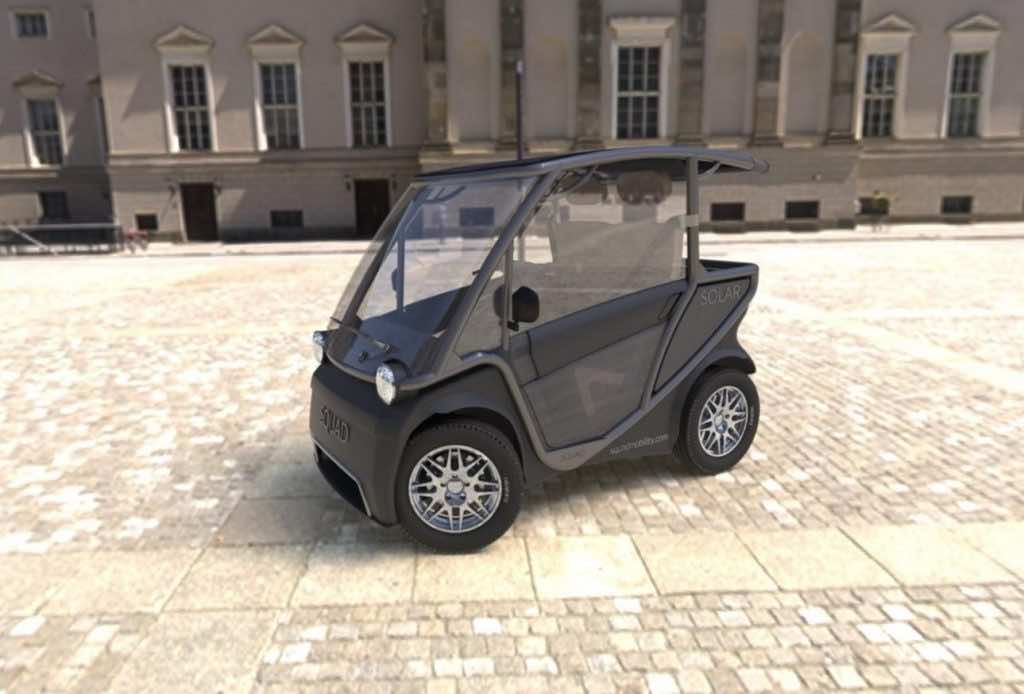Good things come in small packages is somewhat true. Well, especially when it’s “Squad, World’s First Solar City Car.” Squad Mobility is a start-up in the Netherlands whose product might actually be the ultimate solution to the first/last-mile transportation issue. In our opinion, if successful, it could change the world.
The Squad Solar City Car is not an ordinary vehicle. It is a small, affordable, low-speed car that dwarfs even a Smart car; it can seat 2 people and store maybe a couple of your shopping bags. The solar panel charges the vehicle that its roof contains, if by any chance there’s no juice left, the battery could be swapped.
“Urban mobility should be safe, accessible, and hassle-free. It should contribute to a liveable, free and open city life,” Squad Mobility writes in a press issue.
Founded in 2019, Squad Mobility aims to create a zero-emission solution that can be easily integrated into urban cities. The squad solar-powered city car will be available in 2022, making “life simple for everyone.” There are so many applications for this kind of transport in cities, towns, and even villages worldwide
These petite vehicles are designed so that three Squad cars can fit easily into one parking space. They are equipped with smart sensors and cameras to monitor everything from cleanliness to how a car is parked. Fleet operators will even be able to remotely control the car in case it is improperly parked or blocking an exit.
The World Economic Forum report warned earlier this year that last-mile emissions would reach up to 30 percent by 2030 if governments don’t take any precautions; therefore the Squad Mobility’s basic motive is to help the world tackle its last-mile emissions problem.
As Robert Hoevers, CEO of Squad Mobility, says: “cities love solar charging, as this is a sustainable energy source. It decreases the load on the local charging infrastructure and energy demand. In addition, cities are looking for zero-emission mobility solutions with a small space footprint. We have achieved both. A per capita energy consumption lower than public transport and a space footprint comparable to a bicycle. And all this, while offering the flexibility of personal transport and the comfort of a car.”
The Squad cars have a 62-mile (100 km) range with swappable batteries, and they are constantly on charge through their solar panels, providing an extra 12 miles (20 km) per day.
An average user drives 12 km per day in an electric light vehicle (LEV) which the solar panel could easily manage. Aimed at the urban mobility space, the cars will initially be limited to 45 km/h (28 mph), and a more powerful version will be launched later.
Squad Mobility hopes its idea catches on globally, after which it plans to build a faster and more powerful vehicle, says Robert Hoevers.
“[Next] we plan on developing the faster and more powerful 4-person 70 km/h L7 version, expanding geographically, and upgrading the Squad with more features for sharing platforms, such as remote control autonomy,” Hoevers said.
“We have also designed a cargo trailer with more solar panels,” he explained.
The Squad might be the best solution to city mobility, making it an eco-friendly and safer option for everyone. We can’t say more on whether a majority of the people would choose to travel with Solar panel cars or not. So, let’s keep an eye out for Squad Mobility for their official vehicle presentation later this year.

